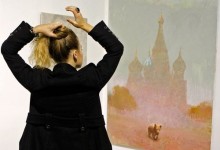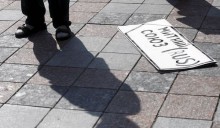For Ukrainian exporters to be able to overcome the negative consequences of the Russian government’s measures to toughen the conditions of cross-border commodity flow, financiers promise to revise the conditions of credit instruments return and are even ready to defer the return of payments. This follows from a media statement by Mykola Voitkiv, chief of the market and operational risks department of the Finances and Credit bank; Dmytro Vlasov, treasurer of Avant-Bank; and Viacheslav Yutkin, deputy chairman of the Prominvestbank board of directors. The latter said, among other things, to The Day: “Although I work at a Russian bank, I think these actions of Russia against Ukraine are extremely unfair. It is not a good-neighborly way. I would accept this action if it were planned and coordinated by [the two countries’] customs authorities. But this raises doubts in the light of the abusive commentaries that this may be a rehearsal of what will happen to Ukraine after she signs the EU Association Agreement and that Russia is psyching herself up for the supply of other producers’ goods to Ukraine. If this is the case, it should not be a surprise for Ukraine, given the large number of visits and contacts between our top officials and Russia’s leadership. I am sure that very few people can comment positively on this action. And I don’t think that such actions will prompt Ukraine in any way to make a positive decision about Customs Union membership. On the contrary, there can be a reverse reaction that will harm Russia. And I think the majority of Russians share this viewpoint because this trade conflict shows wrong methods and is assuming a wrong shape. It is assuming the signs of nothing but a ‘war.’” (Read an exclusive interview with Viacheslav Yutkin in one of the next issues of the newspaper.)
Meanwhile, official Kyiv is trying to assure us that there is now a ceasefire in the Ukraine-Russia trade war. Following telephone conversations between the presidents and prime ministers of Russia and Ukraine and personal visits of Ukrainian ministers to Moscow, it was managed to settle some differences caused, in the words of Ukraine’s Prime Minister Mykola Azarov, by “difference in approaches,” so now Russian customs officers are at least not unloading or reloading the cargoes that cross the Russian border by train.
However, Ukrainian business, which was given a “black spot,” is not exactly rushing to announce a ceasefire. Moreover, Rostyslav Shurma, general manager of the Zaporizhstal steel mill said at a press conference on Tuesday that, taking into account the current situation at the Russian customs territory, the enterprise had suspended the supply of its products to Russia. “As of today, we have stopped shipping our products to Russia. There are no critical stoppages, but we decided to suspend [the supply] not to aggravate [the situation],” Shurma said, adding that he meant suspending the supply of 28,000 tons of products. On the same day, the management of the Kyiv-based confectionary factory Roshen announced, also at a press conference, that Ukraine’s aggregate losses caused by discontinuation of the export of Roshen products to Russia will come to a billion hryvnias by the end of the year. “As for the losses, Ukraine’s losses may exceed one billon hryvnias by the end of this year. It is quite a large amount,” said Yevhen Vovchanovsky, the Roshen confectionary corporation’s development manager. He explained that these losses had accumulated due to unpaid taxes, charges on payroll, and charges on social contributions. Besides, he noted, we should take into account that among those who will suffer losses there will also be the cooperating enterprises that supply Roshen with, for example, packing materials and raw materials. But even in these conditions, none of the losing companies have said that Ukraine should join the Customs Union. They are all saying almost unanimously that it is necessary to mobilize in order to hold out.”
Meanwhile, the Russian media assume that if the cold trade war against Ukrainian imports does not succeed and big capital does not begin to lobby changing Ukraine’s foreign political course in favor of Customs Union membership, Russia “may begin to call names.” For example, Nezavisimaya gazeta does not rule out that the Russian migration service may resort to a mass-scale eviction of Ukrainian guest workers.
Yet Ukrainian experts are convinced that the leadership will not forgo European integration, for this would provoke a political crisis in this country and rob Yanukovych of any chances in the presidential elections. And if Russia continues to hold us in a tight embrace, our helmsmen may pull an unexpected trump card out of the sleeve.
By Alla DUBROVYK, The Day
COMMENTARIES
“REACTION IS YET TO BE. THE STRATEGY HAS NOT BEEN DEVELOPED YET”
Lauras BELINIS, political scientist (Vilnius):
“As usual, Russia is behaving in aggressive economic way. She is interested in dominating in this geopolitical space. For this she needs to get economic and political control over the structures that are now resisting. Ukraine is quite intensely seeking to get out of the authority and dependence from Russian business and politics and get closer to European criteria. Namely this makes Russia bring in the economic instruments that would allow her to stop Ukraine.
“The European Union looks carefully at the current situation, for these economic levers are not totally illegal. There is some aspect of permissiveness, because this is ‘a political market.’ On the other hand, the reaction is yet to be. We don’t hear it because the strategy has not been developed yet; hence there is no voiced reaction.”
“WE MUST ASSESS THE POLITICAL OUTCOMES OF RECENT THREATS ON THE PART OF RUSSIA”
Elmar BROK, head of European Parliament Committee on Foreign Affairs:
“The European Parliament Committee on Foreign Affairs will hold on August 28 an urgent meeting connected with the situations in Egypt and Ukraine. We must assess the political outcomes of recent threats on the part of Russia which may restrict its trade with Ukraine if the country signs the Association Agreement and Free Trade Area Agreement with the EU. This is a serious development which may cast a shadow on the approaching summit in Vilnius.”
“SIGNING OF ASSOCIATION AGREEMENT WOULD BE THE BEST REACTION TO THIS ROW FOR THE EU”
Stefan MEISTER, senior research fellow on political questions at the European Council of International Relations, Berlin:
“From the viewpoint of the EU, this question above all concerns relations between Ukraine and Russia. Brussels has no interest in supporting one side or another in this bilateral trade row. Besides, the assessment of reasons of this row varies among the countries-members of the EU. Of course, some of the members take no interest in conflict with Russia concerning the trade row with Ukraine. This is no question for the EU, the EU will win nothing from intruding.
“The best reaction to this row for the EU would be signing the Association Agreement and Deep and Comprehensive Free Trade Area Agreement, as well as advancement of the EU’s own policy of integration concerning Ukraine. In other words, it would be losing face in one of typical Russian/post-Soviet small economic wars, but realize own economic policy of integration with important countries.
“German government has a neutral attitude to all this and does not want to intrude into bilateral relations of other countries. Even if this question is of major importance for Ukrainian economy, from the point of view of Germany, it is hardly important enough to basically change its policy. Therefore this problem must be resolved by Ukraine’s President Viktor Yanukovych.”
“THE EU AND GERMANY DO NOT HAVE ENOUGH INFORMATION ABOUT THE TRADE DIFFICULTIES”
Susan STEWART, (SWP) German Instituteof Questions of International Policy and Security, Berlin:
“I suppose, the EU and Germany do not have enough information about trade difficulties to draw any conclusion. I haven’t heard about any official stand taken by Brussels, or Berlin. Therefore I don’t think this development will have any affect on Germany’s or EU’s readiness to sign the Association Agreement on the whole.
“As for German Chancellor’s position, more important are the actions Ukraine takes or does not take in order to meet the EU’s demands.”
“IN THIS OCCASION RUSSIA CAN ONLY LOSE”
Dmitri TRENIN, head of Moscow-based Carnegie Center:
“Although it is up to Ukraine to make its choice between Europe and Eurasia, outsiders are trying to help her. The decision of Russian customs service to thoroughly check entire Ukrainian import in the border can cause many-billion losses. The recent attempt taken by Russian president to make his Ukrainian counterpart make a choice in favor of the Eurasian Union, apparently turned out to be vain. Now Moscow is trying to achieve this aim by exerting pressure on its potential partner. Most likely, the result will be analogical.
“There is no doubt that Ukraine, which is still in strong dependence from the Russian market, will suffer. But playing baseball against its neighbors, Russia is also suffering some losses. In the outcome it will lead, however, to revival of Ukrainian nationalism and appearance of national unity in Kyiv. Of course, it won’t last for long, for Ukrainian elite will continue to play its favorite games. European politicians and mass media which are not on recreation during this quiet season will criticize Moscow for bad behavior concerning Kyiv, but they will hardly exceed the limits of this. But since any serious integration is a voluntary process, in this occasion Russia can only lose.
“As a rule, the Kremlin’s policy concerning the post-Soviet neighbors of Russia lies in using a stick and a carrot. It does not have a long-term strategy. This is a primitive and old-fashioned approach. It does not win either respect of reward for Russia among its neighbors. Rather, it adds fuel to local nationalism, periodically replacing it with anti-Russian elements. But abruptly switching between relations of eternal fraternity with Ukrainian people and state of trade war, Mr.Putin is acting effectively counter to his goal. Ukraine won’t join Europe, at least in the near future, but for sure it will not reunite with Russia either.”
Prepared by Ihor SAMOKYSH, Mykola SIRUK, The Day








